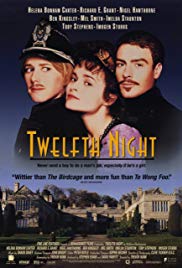TWELFTH NIGHT
SUBJECTS — Drama/England;
SOCIAL-EMOTIONAL LEARNING — Romantic Relationships;
MORAL-ETHICAL EMPHASIS — Caring.
AGE: 12+; MPAA Rating — PG (for mild thematic elements); 1996; Comedy; 134 minutes; Color;
Available from Amazon.com.
There is NO AI content on this website. All content on TeachWithMovies.org has been written by human beings.

SUBJECTS — Drama/England;
SOCIAL-EMOTIONAL LEARNING — Romantic Relationships;
MORAL-ETHICAL EMPHASIS — Caring.
AGE: 12+; MPAA Rating — PG (for mild thematic elements); 1996; Comedy; 134 minutes; Color;
Available from Amazon.com.
One of the Best! This movie is on TWM’s list of the best movies to supplement classes in Drama, High School Level.
TWM offers the following worksheets to keep students’ minds on the movie and direct them to the lessons that can be learned from the film.
Film Study Worksheet for ELA Classes; and
Worksheet for Cinematic and Theatrical Elements and Their Effects.
Teachers can modify the worksheets to fit the needs of each class.
Additional ideas for lesson plans for this movie can be found at TWM’s guide to Movies as Literature Homework Project.
This is an accessible and entertaining version of Shakespeare’s comedy of love, mistaken identity, and confused gender. Moved forward in time to the 18th century, the play begins with look-alike fraternal twins Viola and Sebastian on a sea voyage. Their boat sinks in a storm. Saved but separated, each believes the other to have drowned and each finds love in unusual circumstances.
Selected Awards:
None.
Featured Actors:
Helena Bonham Carter, Richard E. Grant, Nigel Hawthorne, Ben Kingsley, Mel Smith, Imelda Staunton, Toby Stephens, Imogene Stubs, Nicholas Farrell, Steven Mackintosh.
Director:
Trevor Nunn.
This movie is an excellent introduction to Shakespeare. The acting illuminates the language and viewers can easily follow the plot. The play is a romp, full of fun and lyric speeches.
In this play, Shakespeare contends that we can be drawn in friendship and affection to persons of either sex. Sexual attraction is an overlay to the affinity that we feel for people who happen to be of the opposite sex. The major female characters are charming and strong-minded women who control their own lives.
NONE. Note that this movie shifts some scenes and changes some lines. This should make no difference in the enjoyment of the film or of the play.
Ask and help your child to answer the Quick Discussion Question.

William Shakespeare (1564-1616) is recognized as the greatest dramatist produced by Western culture. His plays show a profound knowledge of human nature. They have interwoven plots and events usually have several layers of meaning. Shakespeare’s plays can show us the deepest levels of human motivation. His work is considered one of the greatest accomplishments in literary history.
Shakespeare’s comedies usually have several subplots, with one or two of the major subplots involving uncouth characters. In “Twelfth Night,” one of the comic subplots involves the characters of Sir Toby Belch, Maria, Sir Andrew Agueface (Aguecheek in the original play) and Malvolio.
The Clown (Fool) is the wisest character in this play. Note how intelligently he charms Olivia in Act I Scene V. She is despondent over her brother’s death and orders the Clown taken away. He convinces her to test wits with him to see who is the fool. He then traps her in a riddle which, incidentally, puts the best face on her brother’s death: “The more fool, Madonna, to mourn for your brother’s soul being in heaven. Take away the fool, gentlemen.”
Often quoted phrases from this play:
If music be the food of love, play on,
Give me excess of it, that, surfeiting,
the appetite may sicken and so die.
— Act I, Scene I, lines 1 – 3.
She sat like patience on a monument, smiling at grief. Was not this love indeed?
— Act II, Scene IV, lines 17 & 18.
… [S]ome are born great, some achieve greatness and some have greatness thrust upon’em.
— Act II, Scene V, lines 55 – 57.
1. Why was Olivia attracted to both Viola and Sebastian? How do you explain this?
Suggested Response:
Viola and Sebastian, being twins, were very much alike. Olivia was attracted to personality traits and attributes that they shared.
2. Do you think that the Count would likely be a friend to Sebastian after the marriages?
Suggested Response:
We think that it would be likely because Sebastian was very much like Viola when she was pretending to be a man. Of course, the situation could change after the marriages, but Sebastian still had personality traits that attracted the Count.
3. Do you think that Olivia and Viola will be friends after Olivia married Sebastian and Viola married the Count?
Suggested Response:
We think that it would be likely that Olivia would want to be friends with Viola. Viola still had the basic traits that attracted Olivia when she thought that Viola was a man.
4. What about Antonio? Is he merely a good friend of Sebastian or does he desire a closer sexual relationship with him?
Suggested Response:
This is one of the questions left unanswered by the playwright.
Discussion Questions Relating to Ethical Issues will facilitate the use of this film to teach ethical principles and critical viewing. Additional questions are set out below.
(Treat others with respect; follow the Golden Rule; Be tolerant of differences; Use good manners, not bad language; Be considerate of the feelings of others; Don’t threaten, hit or hurt anyone; Deal peacefully with anger, insults, and disagreements)
1. Evaluate the practical joke that Maria, Sir Toby Belch, and the Fool played on Malvolio. It was pretty funny but it was at the expense of another person. How did their conduct relate to the Six Pillars of Character?
Suggested Response:
The practical joke violated the Pillars of Respect and Caring. It was a terrible thing to do to Malvolio because it played on his weakness (his sense of superiority), built it up by getting him to think that Olivia cared for him, and then suddenly deflated it. The reason it was so funny is that Malvolio’s pride and sense of superiority made him so obnoxious to just about everyone, except Olivia. The audience tolerates the cruelty to Malvolio because, in a sense, it serves him right, but it went much too far. The actions of Belch, Maria, and the Fool were not caring and were not respectful of Malvolio as a human being.
1. Assignments, Projects, and Activities for Use With Any Film that is a Work of Fiction.
2. Divide the class into groups of 10 or less and assign characters to each student to read. The readings can be among the group or with the rest of the class as audience. The smaller parts can be assigned to one or two persons. Suggested scenes to read are described in the Bridges to Reading section.
3. Ask students to list out each separate subplot, trace the lines of each subplot and describe how each subplot contributes to the play as a whole.
4. Ask students to describe the moral message of the play. Another way to put this question is, “What was Shakespeare trying to tell us in this play about the way that people should or should not act?”
5. Ask students to tell you what this play tells us about people. Another way to put this question is, “What was Shakespeare trying to tell us in this play about the way that people act?”
6. Ask the students to select a major character in the play and describe what was motivating him or her.
7. Ask the students to write essays on appropriate questions set out in the Discussion Questions section above.
Read scenes from the play together as a class or a family. You can compete to see who reads various parts best or just enjoy the beautiful language. Suggested scenes to read are: Act One, Scene I; Act Two, Scene IV, and Act Three, Scene II. After you have read several scenes, see the movie again.
Another excellent idea is to assign a character to each person in the class or the family or among friends and to read various scenes, or the entire play if you can. If your family has a literary bent, this can be fun at family gatherings. All of the aunts and uncles, grandmothers and grandfathers can participate.
There are annotated editions of Shakespeare’s plays with explanations of the antique phrases set out in the margins or on a page facing the text. You may want to obtain a copy of one of these books from the library before reading scenes from the play.

TWM offers the following worksheets to keep students’ minds on the movie and direct them to the lessons that can be learned from the film.
Film Study Worksheet for ELA Classes; and
Worksheet for Cinematic and Theatrical Elements and Their Effects.
Teachers can modify the worksheets to fit the needs of each class.
Additional ideas for lesson plans for this movie can be found at TWM’s guide to Movies as Literature Homework Project.
What is Shakespeare trying to tell us in this play about the nature of attraction, both the attraction of friendship and romantic attraction?
Suggested Response:
This is a matter of interpretation and different people will have different views. In this play Shakespeare was exploring the similarities and differences between friendship and romantic attraction. Olivia falls in love with Viola (the female twin) when she is dressed as a man and very easily transfers that love to Sebastian, the male version of the Sebastian/Viola personality. Shakespeare is telling us that romantic love appears to be a gloss over some basic level of attraction that people of either sex can feel for each other. A good name for this type of attraction is friendship. This analysis is confirmed by the fact that the Count, when he discovers that his friend/groom (Viola in man’s dress) is a woman, immediately develops a romantic attraction to her. One gets the feeling that this attraction, based on a true friendship, will serve the Count better and last longer, than his love for Olivia, a person he adored from afar, never really knew, and dealt with through intermediaries.
* we respect your privacy. no spam here!